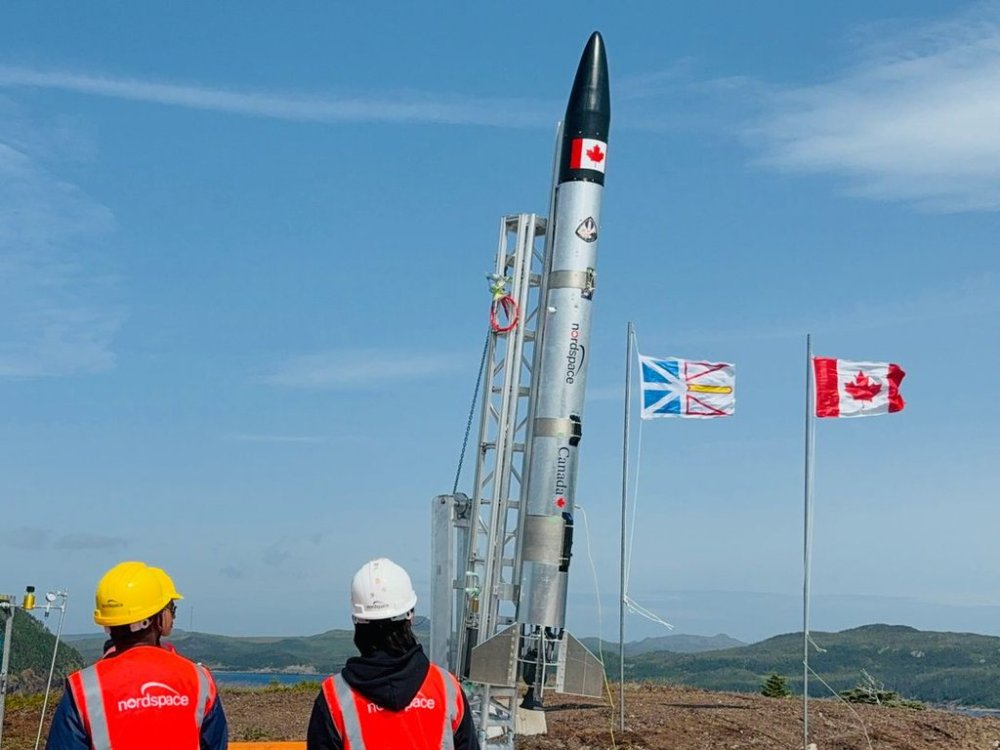Fire delays NordSpace’s Newfoundland rocket takeoff amid Canadian space race
Advertisement
Read this article for free:
or
Already have an account? Log in here »
To continue reading, please subscribe:
Monthly Digital Subscription
$0 for the first 4 weeks*
- Enjoy unlimited reading on winnipegfreepress.com
- Read the E-Edition, our digital replica newspaper
- Access News Break, our award-winning app
- Play interactive puzzles
*No charge for 4 weeks then price increases to the regular rate of $19.00 plus GST every four weeks. Offer available to new and qualified returning subscribers only. Cancel any time.
Monthly Digital Subscription
$4.75/week*
- Enjoy unlimited reading on winnipegfreepress.com
- Read the E-Edition, our digital replica newspaper
- Access News Break, our award-winning app
- Play interactive puzzles
*Billed as $19 plus GST every four weeks. Cancel any time.
To continue reading, please subscribe:
Add Free Press access to your Brandon Sun subscription for only an additional
$1 for the first 4 weeks*
*Your next subscription payment will increase by $1.00 and you will be charged $16.99 plus GST for four weeks. After four weeks, your payment will increase to $23.99 plus GST every four weeks.
Read unlimited articles for free today:
or
Already have an account? Log in here »
ST. JOHN’S – Fire and smoke delayed a space company’s plans on Tuesday to launch a rocket from Newfoundland, amid a Canada-wide race to develop aircraft and spaceports capable of sending satellites into orbit around the Earth.
NordSpace was preparing to launch its five-metre-long Taiga rocket from its spaceport near St. Lawrence, N.L., on Newfoundland’s Burin Peninsula. But at 11:32 a.m. local time, the company’s livestream of the launch site showed flames and black smoke erupting near the aircraft.
An update posted to the company’s website said it had to delay the launch “due to an anomaly on the launch pad.”

“Rocket, pad, and personnel are safe. We are working to resolve the issue and return to launch,” the update said. Later, in a comment on its livestream, the company said it would reschedule the launch to Wednesday morning.
If all goes according to plan, the Ontario-based company says its operation will be the first fully commercial space launch in Canadian history.
Canada does not have the ability to launch satellites into space to orbit the Earth, though there are several companies — including NordSpace — vying to make that happen, said Jean-Claude Piedboeuf, senior vice-president of space programs at the Canadian Space Agency.
A successful orbital launch program needs a rocket and a launch pad, he said. And while there are several rocket companies, there are few spots that will make a good launch pad. “The launch pad is the limitation,” Piedboeuf said in an interview. “You need to be close to the ocean, because you don’t want to launch where people live.”
St. Lawrence, the closest town to the NordSpace launch pad, is home to about 1,115 people. The community sits on the edge of a wide-open stretch of the Atlantic Ocean.
A successful launch would be a “major accomplishment,” for NordSpace and the country, Piedboeuf said.
“It would (position) Canada as a country with a new launching capability that could be used in the future,” he said.
Taiga is a suborbital rocket, which means it will not enter the Earth’s orbit when launched. However, NordSpace is also working on an orbital rocket, called Tundra, which it hopes to send into space in 2027. Orbital rockets can be used to place satellites into orbit around the Earth.
In a news release earlier this month, NordSpace said a successful Taiga launch will help it work toward an orbital launch program.
But the company has competition. Last month, Halifax-based Maritime Launch announced it signed a deal with Reaction Dynamics, a rocket company in Montreal, that could pave the way for the country’s first orbital rocket launch, from a spaceport in Nova Scotia.
Students at Concordia University launched a rocket from a remote site in northern Quebec last month. The rocket split into pieces shortly after takeoff and did not reach space. But the students still claimed success, deeming the effort the first attempted space launch in Canada this century.
NordSpace attempted a launch on Aug. 29, but an issue with Taiga’s safety system kept the rocket anchored to the ground. The company said it would have tried again the following day, but its launch authorization expired and it had to wait for a new licence.
The company’s latest launch window runs from Sept. 20-27.
This report by The Canadian Press was first published Sept. 23, 2025.
— With files from Sidhartha Banerjee in Montreal

